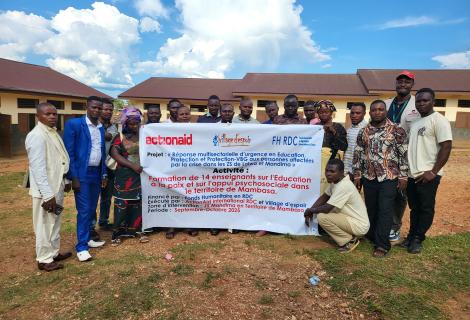Peace Education Training for 14 Club Facilitators Aims to Foster Social Cohesion in Crisis-Affected Schools.

14 teacher club facilitators from seven schools undergo intensive training to manage conflict and foster a culture of non-violence in crisis-affected classrooms.
The relentless, multi-faceted crisis in Ituri Province continues to cause significant instability, displacing over one million people and profoundly compromising access to essential services, including education. To counter the cycle of violence and fragility, the "Multi-sectoral Emergency Response in Education, Protection, and GBV-Protection" project is actively working to restore quality learning environments. As part of this integrated effort, a pivotal training on Peace Education was successfully conducted on October 16-17, 2025, in Mandima. The session engaged 14 teacher club facilitators and aimed to empower them to create secure, inclusive, and peaceful school climates where children, especially those affected by conflict, can safely learn, express themselves, and rebuild social skills.
Objectives: Fostering Resilience and Cohesion
The core purpose of the two-day session was to directly address the trauma and instability caused by the crisis by utilizing the school environment as a tool for peace. The training, which engaged a total of 21 beneficiaries (11 men, 9 women, and 1 man with disability), was built around three essential objectives:
- To equip teacher club facilitators with the foundational principles and practical approaches of Peace Education for effective use within the school setting.
- To strengthen the facilitators' ability to manage students positively and inclusively, with a special focus on the needs of children affected by the ongoing conflicts and violence.
- To elevate the role of student clubs as structured, safe, and nurturing spaces for learning, expression, and social cohesion among children from diverse and often conflicting communities.
Methodology: From Theory to Schoolyard Practice
The training successfully brought together 14 teacher club facilitators from seven partner schools (two facilitators per school). Facilitated by the EPST inspector, the approach was highly interactive and participatory to ensure practical application of the concepts.
Key methodologies included:
- The module focused on the concepts of peace, the causes, types, and consequences of conflicts, and essential values and attitudes that foster sustainable cohabitation.
- Sessions utilized interactive presentations, brainstorming, detailed case studies in subgroups, experience-sharing, and practical role-playing exercises. This methodology allowed participants to put theoretical notions into practice and exchange on the real-life challenges of teaching children from different, affected communities.
Achievements: A Foundation for Lasting Peace
The successful execution of this activity marks a significant step toward creating a peaceful and inclusive school environment:
- The teachers are now better equipped with the tools and competencies necessary to positively manage student clubs and instill a peaceful, respectful school climate within their communities.
- The children who are beneficiaries of these clubs now have access to safe, secure spaces to learn, express themselves, and develop critical social and civic skills that build resilience against the impact of the crisis.